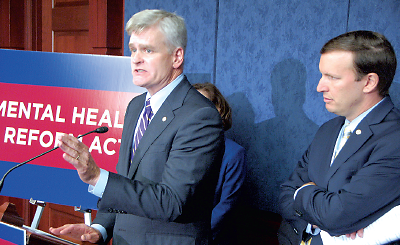Comprehensive MH Reform Bill Introduced in U.S. Senate
Abstract
The bill is a companion to the bipartisan bill introduced in the House in June by Reps. Tim Murphy and Eddie Bernice Johnson.
A bipartisan pair of U.S. senators introduced on August 4 the Mental Health Reform Act of 2015, intended to expand access to care, enforce parity, and increase the mental health workforce.

Sen. Chris Murphy (D-Conn.; second from right) is the cosponsor of a new Senate bill on mental health reform with Sen. Bill Cassidy (R-La.; right). The legislation looks to expand access to care, enforce parity, and increase the mental health workforce. Joining the senators at a press briefing announcing the introduction of the legislation was APA CEO and Medical Director Saul Levin, M.D., M.P.A. (at podium).
The bill is just the latest in a series of legislative proposals that highlight bipartisan support for mental health reform. The new bill, put forth by Sen. Bill Cassidy (R-La.) and Sen. Chris Murphy (D-Conn.), would build inpatient and outpatient capacity, invest in research and dissemination of best practices, and support better coordination of physical and mental health care. It also includes $40 million in additional research money for the National Institute of Mental Health and funds for a new state grant program to expand integration of primary care and behavioral health.
“The nation’s mental health system needs reform and investment, and we applaud Sens. Murphy and Cassidy for this comprehensive reform initiative,” said APA CEO and Medical Director Saul Levin, M.D., M.P.A., during a press conference. “We will work with legislators on both sides of the aisle to accomplish mental health reform.”
Levin also noted that APA was pleased to see that many of the important provisions in the Helping Families in Mental Health Crisis Act (HR 2646)—the bill previously introduced in the House by Reps. Tim Murphy (R-Pa.) and Eddie Bernice Johnson (D-Texas)—are included in the Senate bill.
For instance, the House and Senate bills both establish a new position of the assistant secretary for mental health and substance use disorders within the Department of Health and Human Services (HHS). The position would have to be filled by a doctoral-level clinician.

Sen. Bill Cassidy (R-La.; left) says that the Mental Health Reform Act of 2015 will lead to the development of meaningful solutions to improve outcomes for patients and families dealing with mental illness. At right is Sen. Chris Murphy (D-Conn.).
The two versions differ on the fate of the Substance Abuse and Mental Health Services Administration (SAMHSA), whose current administrator, Pamela Hyde, J.D., resigned on August 4. The House bill would essentially merge the agency’s duties and responsibilities into the new assistant secretary’s office, while the Senate version would place the agency under the control of the new assistant secretary.
The House and Senate bills are sufficiently compatible so that if they both pass, a conference committee is likely to work out the remaining differences.
“We are proud to be working with our colleagues in the House,” said Sen. Murphy. “These two bills represent the best chance of getting behavioral health legislation passed.”
The Cassidy-Murphy bill also looks closely at HIPAA and whether that law prevents clinicians from giving families information about the diagnosis, treatment, or even the whereabouts of relatives with mental illnesses. The bill would not substantially change the law but would provide clinicians with clarifying guidance and an educational campaign about disclosure requirements.
The bill would push for stronger implementation of mental health parity by requiring the departments of Labor, HHS, and Treasury to conduct audits of insurance companies to evaluate compliance. It also includes the establishment of a “nationwide strategy” to address the national mental health workforce shortage.
“This bill gives hope to patients, to families, and to our society and redirects [patients] down a path that ends in wholeness,” said Sen. Cassidy, a gastroenterologist.
Other senators have put forth several additional bills that touch on issues related to mental health. Sens. John Cornyn (R-Texas) and Lindsay Graham (R-S.C.) on August 5 introduced legislation that seeks reforms to address the problem of the criminalization of people with mental illness. It has the support of both the National Rifle Association and the National Alliance on Mental Illness.
These proposals join another bill introduced by Sen. Lamar Alexander (R-Tenn.) and Sen. Patty Murray (D-Wash.) on July 29 that largely reauthorizes existing mental health programs.
The committees overseeing the legislation—the Senate Health, Education, Labor, and Pensions and the House Energy and Commerce committees—are planning to act after the summer recess. ■
“Cassidy, Murphy Introduce Comprehensive Overhaul of Mental Health System” can be accessed here.



